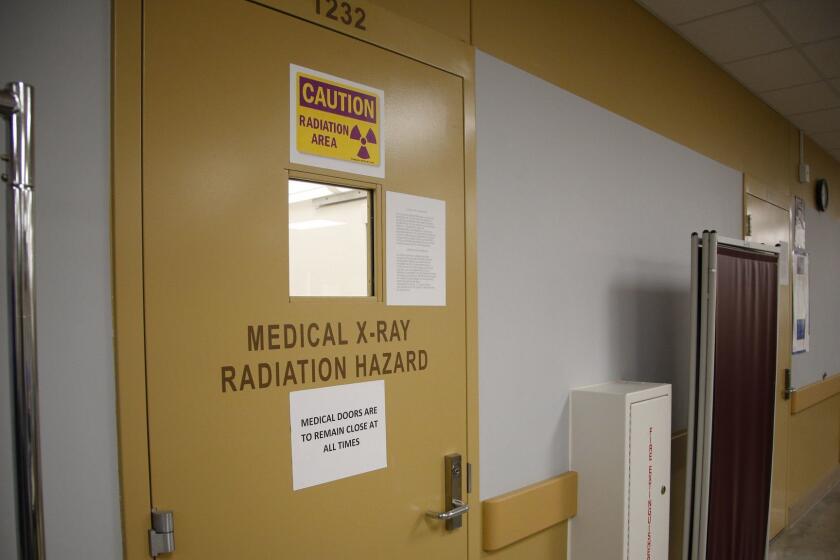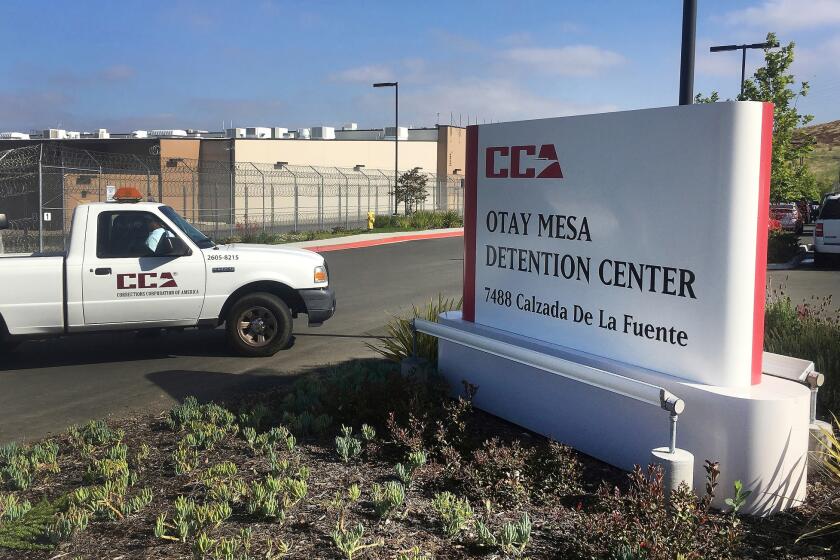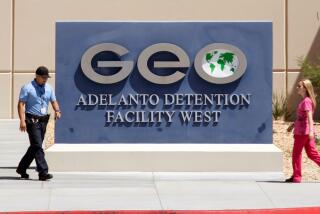Judge declines to order release of more medically vulnerable ICE detainees
A San Diego federal judge has denied a request to force immigration authorities to release dozens of additional medically vulnerable detainees who are at heightened risk of developing serious complications should they be sickened with COVID-19.
In his order, filed Tuesday, U.S. District Judge Dana Sabraw said the conditions inside Otay Mesa Detention Center had improved over the last several weeks, and the medically vulnerable detainees still there appeared to face a lower likelihood of contracting the disease.
The facility has become a flashpoint in the debate over detention in the age of the coronavirus. Otay Mesa has consistently logged the highest number of coronavirus cases among all immigration detention centers in the country. A separate part of the facility houses inmates who are charged with a variety of federal crimes not necessarily immigration related.
As of Tuesday afternoon, 233 people in custody at the facility have tested positive for the virus at some point over the last few months, according to documents obtained by the San Diego Union-Tribune. Of those, 162 are U.S. Immigration and Customs Enforcement detainees and 71 are U.S. Marshals Service inmates. Twenty-nine employees of CoreCivic — the private company that runs the facility — have also tested positive, as well as nine medical staff.
The American Civil Liberties Union filed a lawsuit in April demanding the release of immigration detainees being held there.
On May 1, Sabraw issued a temporary restraining order that directed ICE to identify and consider for release detainees who are “medically vulnerable” to COVID-19.
Detainees held by ICE and the U.S. Marshals Service are concerned that people who tested positive for the virus have been returned to their units too quickly.
Since then, ICE has released 92 of the 134 people identified. An additional at-risk person is expected to be released soon, while another died in a hospital before he could be released. The 34 medically vulnerable people remaining in custody have been deemed by ICE as potential dangers to the community, and ICE has declined to release them.
The ACLU’s request for a preliminary injunction sought additional steps: prohibiting new detention of released subclass members, prohibiting any new admissions to Otay Mesa, and ordering the release of the remaining subclass members. ACLU attorneys argued that there were ways to mitigate public safety concerns and that some of the remaining at-risk detainees had criminal convictions that were several years old.
In considering the request, Sabraw explained in his order that much has changed at the detention facility since he issued his first directive. For instance, medically vulnerable detainees have now been identified, more protection and sanitation policies are in place and new admissions have been suspended. The facility is now operating at 38% capacity, with 489 detainees awaiting civil immigration proceedings or deportation and 269 criminally charged inmates.
Thirty of the medically vulnerable ICE detainees are living in units without people who have tested positive. The remaining four are in L pod, described as the only unit with positive-test detainees that’s currently housing medically vulnerable people. L pod detainees are able to live in single cells, and three of the four tested positive for the coronavirus prior to the order and have presumably built up immunity to reinfection, Sabraw said.
Detainees at Otay Mesa Detention Center had complained of not having protective gear such as masks and not having adequate soap as precautions during the COVID-19 pandemic. New surgical masks arrived Friday, but they initially came with conditions -- a contract, one detainee says.
“Social distancing throughout the facility is possible,” he added.
He said while Otay Mesa still has the most cases nationwide as of last week, the rate of infection appears to be decreasing.
The judge also continued to give the government discretion over detention decisions, noting ICE’s determination that the remaining medically vulnerable detainees — many with “significant” criminal histories — may not be suitable for release due to public safety concerns.
Sabraw earlier this month denied the ACLU’s request in a separate lawsuit to order the U.S. Marshals Service to release medically vulnerable inmates at Otay Mesa.
Staff writer Kate Morrissey contributed to this report.
More to Read
Start your day right
Sign up for Essential California for news, features and recommendations from the L.A. Times and beyond in your inbox six days a week.
You may occasionally receive promotional content from the Los Angeles Times.









